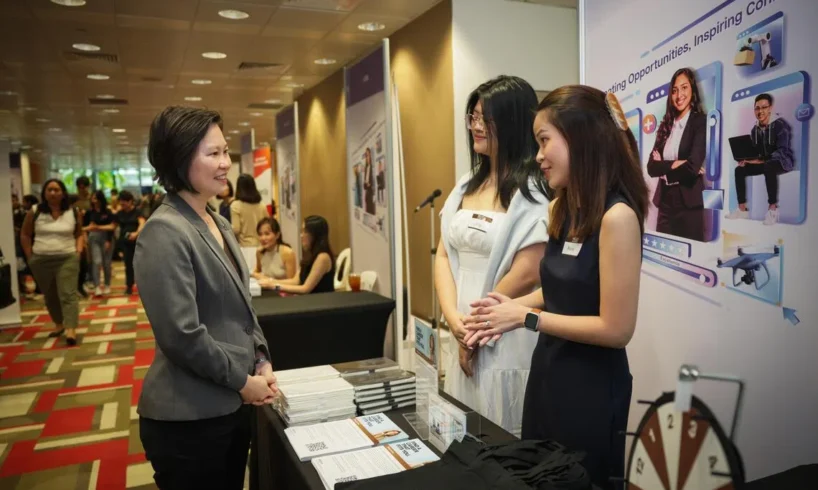
SINGAPORE – Employment outcomes for the graduating cohort of polytechnics in 2025 are “comparable” with past years based on preliminary findings, said Minister of State for Trade and Industry Gan Siow Huang on Oct 22.
“Employment rates, as well as job vacancies, remain high,” she said, without providing figures. The Straits Times has asked the Ministry of Education for the preliminary data.
“Under the current economic climate, it is understandable that some of our graduates may feel some anxiety and uncertainty about job search,” said Ms Gan on the sidelines of Singapore Polytechnic’s (SP) annual Career and Further Education Fair.
She added that some companies have indicated plans to slow down hiring plans.
“It’s important that we really put all our efforts together to help our graduates in finding the jobs and the training opportunities that they need,” she said.
The latest Graduate Employment Survey
, which collected data from the graduating cohort of 2024 from the five polytechnics, showed that 54.6 per cent of them were in full-time permanent jobs in 2024.
In 2023, almost 60 per cent were in full-time permanent jobs, and in 2022, the figure was 59 per cent.
The median gross monthly salary of polytechnic graduates in full-time permanent employment grew to $2,900 in 2024 up from $2,800 in 2023.
In 2024, there were 10,045 fresh polytechnic graduates.
Held at SP’s campus in Dover from Oct 22 to 23, the fair is open to all students and members of the public. About 3,000 participants — including students, alumni and employers — are expected to visit the fair.
More than 500 job roles, internship and training opportunities across 57 organisations are available at the fair. These include Mediacorp, Singtel, SMRT, UOB, and the Singapore Armed Forces.
“I’m actually very heartened that employers and our institutes of higher learning are coming together to support our students — whether it’s in career coaching, providing internship, and also helping our students navigate the job landscape,” Ms Gan said, adding that there are employers still looking to hire fresh graduates, even though there are uncertainties.
This comes as the Graduate Industry Traineeships Programme (GRIT), a Singapore government-funded initiative for fresh graduates to gain industry experience and enhance employability, was launched at the start of October.
The programme offers up to 800 traineeship positions in various growth sectors, lasting three to six months.
Ms Gan said the programme has drawn “quite healthy” demand, without giving the number of application figures. About 50 companies have indicated “strong interest” to participate and offer internship opportunities in a variety of sectors, she said.
“I hope that traineeships like this will be able to complement the job market and help our graduates land suitable jobs in time to come, and in the meantime, pick up new work networks, new skills, and clarify their career goals,” she said.
SP is one such organisation participating in GRIT, offering nine traineeship positions as at Oct 16. It also recently set up an Employment Support Office to support students and fresh graduates.
For 20-year-old Cherilynn Chia, who chose to take a gap year after graduating from Singapore Polytechnic earlier in 2025, taking time to find the right path meant more than “working for the sake of it”.
She had applied for university admission and received acceptance letters, but the food science and technology graduate realised that she wanted to try something different from what she had studied.
Minister of State for Foreign Affairs and Trade and Industry Gan Siow Huang (right) in a conversation with Ms Cherilynn Chia during Singapore Polytechnic’s annual Career and Further Education Fair on Oct 22.
ST PHOTO: GIN TAY
Ms Chia worked for three months as a food technician, but felt that it was not a good fit.
“Through the whole job process, I learned a lot definitely about myself — what I like and what I look for in a job,” she said.
She was apprehensive about taking a gap year to discover her interests, she said. “I always thought that I had my route and life planned out, but suddenly changing from working full-time to taking a gap year, or considering furthering my studies, was a confusing period.”
But her anxiety eased after speaking with career guidance counsellors from SP, and Ms Chia is now determined to spend her gap year building a portfolio to pursue media or marketing-related studies, having dabbled in video editing. She is also working part-time as a barista.
“For me, a job should come with purpose,” she said. “I would rather take a gap year and figure things out on my own terms, rather than rushing to find a job for the sake of it.”
Ms Chia said she felt a bit of pressure as her peers were already studying or working. “But I think reminding myself that I’m only just 20, and I still have time to figure things out, makes it a lot better.”





